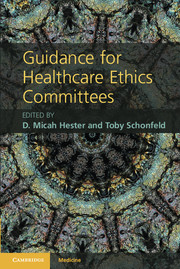Book contents
- Frontmatter
- Contents
- Contributors
- Preface
- Section 1 The Context of Healthcare Ethics Committee Work
- Section 2 Consultation
- Section 3 Policy Development and Organizational Issues
- Section 4 Educating Others
- 20 The healthcare ethics committee as educator
- 21 Education as prevention
- 22 Understanding ethics pedagogy
- Index
- References
20 - The healthcare ethics committee as educator
Published online by Cambridge University Press: 05 August 2012
- Frontmatter
- Contents
- Contributors
- Preface
- Section 1 The Context of Healthcare Ethics Committee Work
- Section 2 Consultation
- Section 3 Policy Development and Organizational Issues
- Section 4 Educating Others
- 20 The healthcare ethics committee as educator
- 21 Education as prevention
- 22 Understanding ethics pedagogy
- Index
- References
Summary
Objectives
Describe topics in ethics that can be assessed to determine the ethics knowledge level of HEC members and the organization at large.
Identify at least ive strategies for educating physicians and organizational staf about ethics.
Describe mechanisms for tracking and evaluating the HEC’s educational eforts.
Case
The Metropolitan Care Hospital Ethics Committee received a request for consultation from the ICU regarding whether life-sustaining treatment should be continued for a patient with multiple organ system failure. The patient, Mr. Jansen, had recently been admitted from an area nursing home and had no family or guardian to assist with making healthcare decisions. The ICU physician, who did not believe that continuing treatment would reverse Mr. Jansen’s decline, and that the treatment might actually be causing Mr. Jansen pain and discomfort, was unsure what decision should be made. The Ethics Committee tracking system indicated that this was the third case involving medical decision-making for patients without a surrogate decision-maker that had been referred to the committee in the last 2 months.
Introduction
Of all of the potential roles of healthcare ethics committees (HECs), the role of “educator” is arguably the most fundamental and enduring role of the committee. In addition to traditional training opportunities, every policy examined, every retrospective review of a recurring issue at the institution, every organizational and managed care issue studied, and every concurrent consultation becomes an opportunity for education – not only for committee members, but also for patients, families, and the healthcare staf at large. An efective HEC will consider carefully and intentionally how its role as educator will be articulated and implemented and how the institution will evaluate the committee’s efectiveness in this role.
- Type
- Chapter
- Information
- Guidance for Healthcare Ethics Committees , pp. 155 - 163Publisher: Cambridge University PressPrint publication year: 2012
References
- 1
- Cited by



